Rutgers' Innovative Courses

The start of a new academic year is exciting and full of possibilities to learn and explore in the classroom with our world-class faculty. Here are some courses students can take to tackle global challenges, learn to be better citizens, explore science and research and find opportunities to develop the skills to be successful at Rutgers and beyond.
Harry Potter and Potion Making Science (and Other Byrne Seminars)
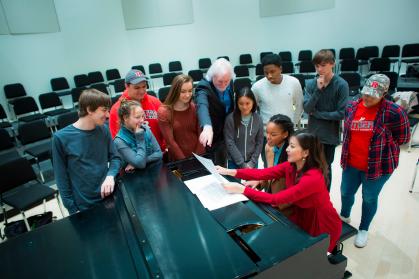
Byrne seminars provide first-year students an opportunity to learn about some of the original faculty research that takes place at Rutgers. Students can explore the modern medicine-making process and the basics of biomedical research in “Harry Potter and Potion-Making Science’’; develop an understanding of the myths and realities of AI, Machine Learning and Chat-GPT; learn about the serious business of having fun and take in a home game in “Play: From Prehistory to Rutgers Football”; and take a course with President Jonathan Holloway on “Citizenship, Institutions, and the Public,” among many others.
Learn About Entrepreneurship
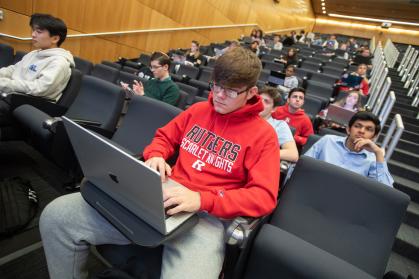
Rutgers offers many opportunities to learn about the fundamentals of becoming an entrepreneur. Students can begin to understand the business planning process and underlying concepts associated with successful startup ventures in “Introduction to Entrepreneurship” at Rutgers Business School. Students can also delve into case studies of some of the most iconic entrepreneurs and executive leaders including Elon Musk, Taylor Swift and Oprah in “Creativity, Innovation, and Entrepreneurship.”
Develop the Skills for a Career in Administration in the Arts
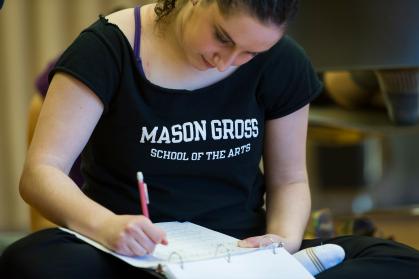
A new minor in Arts Management and Leadership is offered in collaboration between Mason Gross School of the Arts and Rutgers Business School. A core class, "Introduction to Arts Leadership,' taught by a professor of management, is being offered for the first time this fall. The minor provides students interested in the arts a chance to build skills in economic and financial literacy, data analysis software, management and teamwork for arts administration careers in education and outreach, arts marketing, development and grant seeking and production.
Take Classes at the Eagleton Institute of Politics
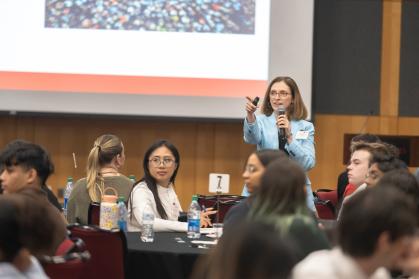
Explore the principles of voting and civic engagement – and hit the ground to register voters and get out the vote in “Topics in Political Science: Citizenship and Civic Engagement” as part of the Darien Civic Engagement Project taught by Ginger Gold Schnitzer, Eagleton’s director of education and strategic initiatives. Learn about “Talking Politics’’ in productive ways in a Byrne Seminar taught by Eagleton Director Elizabeth Matto or take a class in “Political Campaigning” taught by Mike Duhaime, former political director of the Republican National Committee who has worked at the highest levels of U.S. politics in senior roles for President George W. Bush, Sen. John McCain and Gov. Chris Christie.
What Defines a Hero?

What makes ordinary people do extraordinary things? This signature course in the School of Arts and Sciences at Rutgers-New Brunswick offers a comparative examination of the concept of heroism across cultures, time and gender. What can a culture’s heroes or heroines tell us about its values, expectations and ideals? What motivates someone to go beyond the individual and ordinary to sacrifice for a community, country or humanity? This course explores the cultural conditioning, ethical reasoning and moral compass behind some of the greatest heroes and heroines in history and literature from Greek epic heroes to Chinese assassin-retainers, women warriors to samurais, Shakespearean tragic heroes to contestants in the real-life Game of Thrones in medieval Europe, civil rights leaders to women’s rights crusaders and comic "supers" to modern day heroes.
Advancing Addiction Research
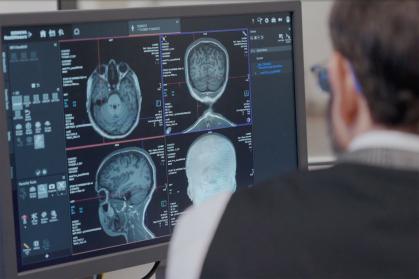
Rutgers Addiction Research Center, the largest comprehensive addiction research center in the United States, is introducing new courses to build an addiction research training program for underrepresented students. The new academic opportunities are supported with funding from the National Institute on Drug Abuse.
The program will introduce new undergraduate courses, "Data Science and Addiction Research'' 1 and 2, followed by a mentored research experience and professional development, all steps geared toward graduate school preparation, with the ultimate goal of increasing diversity among those entering addiction research.
Examine the Suspicions Behind Friday the 13th
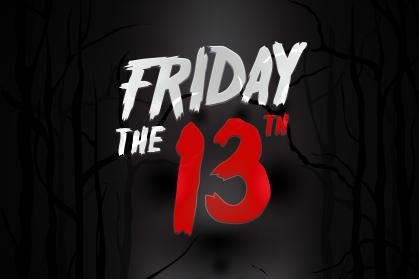
This semester, Friday the 13th appears twice on the calendar, in September and December. Anthony Tobia, Robert Wood Johnson Medical School professor of psychiatry, will discuss issues related to mental health depicted in the film as part of his class, “Film Depictions to Learn Elements Related to Mental Disorders.” On the two Fridays, medical students will go to Blairstown, N.J., where Friday the 13th was filmed to participate in a didactic that will be hosted on Instagram. Additionally, the September excursion will include a visit to the Paranormal Museum in Asbury Park for one of its dollhouse tours, which showcases its haunted dolls collection.
Take a Class With One of the State’s Highest-Ranking Officials
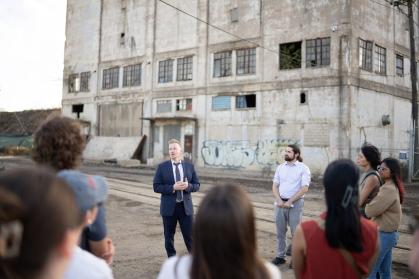
Alumnus Shawn LaTourette, commissioner of the New Jersey Department of Environmental Protection, is teaching a course at Rutgers Law School on environmental justice – the right of all people regardless of income, race, ethnicity, color, or national origin to live, work, learn, and recreate in a clean and healthy environment. Students will study the key pillars of U.S. environmental law and its intersection with civil rights law while exploring the recent advancements in environmental justice at the state and federal levels.
RU-FIT International Students

Rutgers welcomed students from 83 different countries as part of its incoming class this fall. RU-FIT is a one-credit course developed by Rutgers Global and taught by peer leaders – Rutgers juniors and seniors (often international students themselves) – that helps students from abroad adjust from campus life in the United States, providing tips on everything from navigating university resources to understanding American idioms to make the language less confusing. This fall, 753 students are enrolled in the course, which is being taught by 36 peer leaders.
Disinformation Detox

This media literacy course taught by Gina Marcello from the School of Communication and Information helps students learn to navigate a polluted media landscape, evaluate science and health information and delve into the psychology of misinformation. Other topics covered in the class include journalism, citizenship and democracy; race, gender and class; screens and influencer culture; and counter practices to bring about change.
Explore Why People Enter a Life of Crime
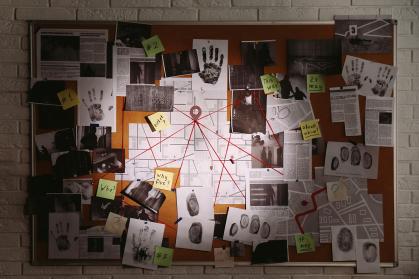
This Rutgers-Camden course aims to lift the veil on the shadowy figures who make up the past, present, and future of Philadelphia organized crime. Exploring groups like the Italian Mafia and the city’s notorious biker gangs, students will consider definitions, rituals, investigative techniques and statutes related to Philadelphia’s criminal enterprises and law enforcement efforts to quash their influence. These real-world examples will help students to answer the ultimate question of why people become members of crime groups.

Creative Writing With Roxane Gay
Students interested in creative writing or publishing as a career path can take a non-credit class with New York Times best-selling author and social commentator Roxane Gay, the Gloria Steinem Endowed Chair in Media, Culture and Feminist Studies.
Selected students attend virtual meetings to discuss how to be a writer, how to be heard, and how to navigate the publishing industry. This opportunity, full for the fall semester, is open to Rutgers undergraduate and graduate students by application.
A Murder Mystery Style Approach to Teaching Principles of Medication
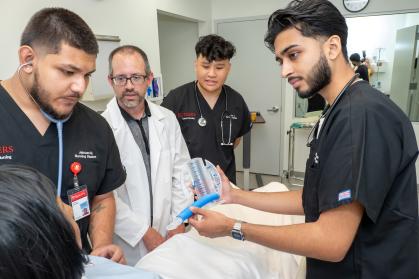
The School of Nursing has found an innovative way to engage students in one of the most important skills they will use in their field: administering the correct dosage of medicine. In this course called “Nursing Care of Healthy Populations,” students are asked to solve a mystery identifying the incorrect dosage administered to a patient who died. The approach is so unique that the professor, Glenn Murphy, published a journal article about it in Nursing Education Perspectives.
Philosophy Through Film

This Rutgers-Newark course tackles some of the major questions in philosophy, such as what’s real, what is the self, what counts as knowledge, are our actions free and how can there be evil in the world, through the analysis of selected films including The Matrix. The use of films not only presents key-philosophical themes to students in an approachable way but also engages them more effectively by using a level of discussion not found in more traditional teaching of philosophy. The combination of rigorous philosophical analysis with the art of filmmaking also highlights the impact of philosophy in our culture at large.




